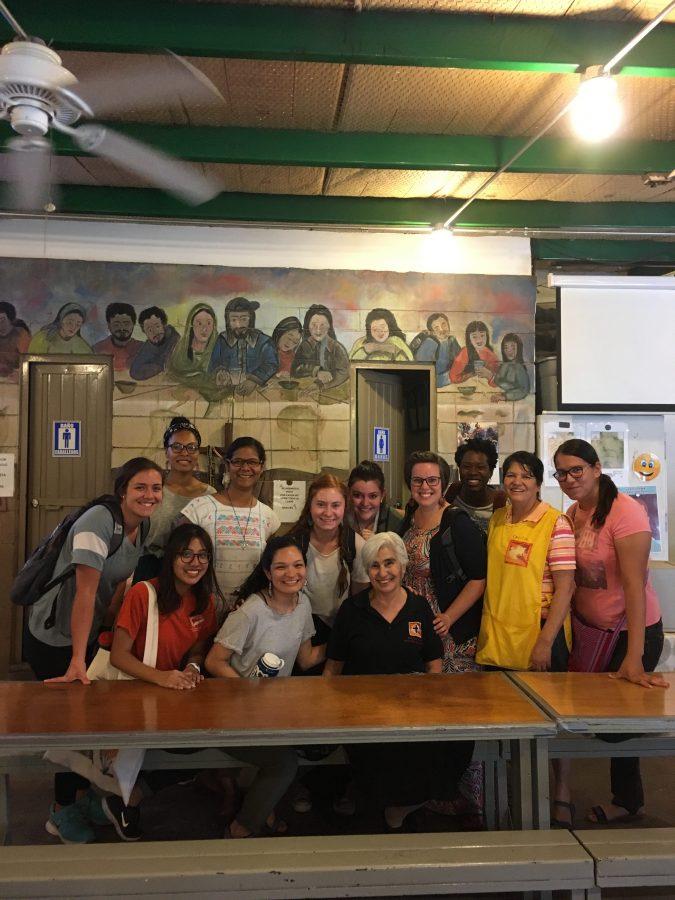Gabriella Romo ’21 reflects on her time along the borderlands during her immersion trip with the Kino Border Initiative (KBI) last May and explores what it means to humanize.
I want to invite your eyes to coordinate with your heart, because that component of connectedness is necessary for these sacred stories.
Old questions were answered and new questions emerged from this journey, all of which invited me to explore. Each and every one of us experienced the meaning of the Kino Border Initiative’s three words: humanize, accompany, and complicate.
Alone, these words are limited to their simple definitions. But when applied to the story of migration, their meanings must be excavated by a willingness to draw close to others. In the midst of the national conversation of migration policy, I have observed an overwhelming number of people disregarding this conversation due to a disconnect with the affected immigrants.
Too often, a migrant’s narrative is ignored and does not seem to have a place in this conversation. I have come to create a tangible definition of what it means to humanize, informed by the stories of pain and spiritual exhaustion.
With the desert heat hugging us as we walked into our neighboring nation, our guide Joana called our attention to the ease of that very act, stating “Your privilege starts here.” There was no Border Patrol, no one to check our passports, and no one to verify that we weren’t threats, no one to inspect our existence.
It was a free-flowing port-of-entry from Nogales, Arizona into Nogales, Sonora as if it were an average stroll to the next street over. We entered through a narrow, gated pathway which led to a revolving gate, originally designed for migrants who were being deported.
I was standing and walking in the exact steps where migrants in shackles would walk through. Their journey into Mexico was painfully different from mine, one journey being of privilege and the other being a violation against one’s own will.
This walk was one of my first encounters with the blatantly inhumane policies existing in the immigration system. At the hands of those who carry out these laws, migrants are robbed of their humanity. In this system, a person’s citizenship status can be the determining factor of their treatment, and that same status serves as justification for them to be herded around in shackles.
The magic of the “comedor” was made possible by the women who organized it. The “comedor” is a sacred place where migrants are provided with nourishing meals, clothes, medical attention, and love. When going into the comedor to interact with the migrants, I couldn’t help but sense the differences between us— I was a stranger who was American, had citizenship-privilege, and had the ability to go back and forth between the U.S. and Mexico. Who was I to just come in, hear their stories, and leave?
The exchange of wisdom between our migrant friends and ourselves helped me realize that my role in that space wasn’t just to listen to their stories. They affirmed the fact that we were part of their healing process by listening to them with attentiveness and by making them feel like humans—not just a number.
After some of the women shared their stories of separation, they spoke of how nourishing it was to share a story they had harbored. I eventually realized that breaking bread with someone and listening to their stories forms a certain bond. With my broken Spanish and their tender patience, I formed friendships with Jose, Armando, Juan, Katia, and Jose Luis. My hope is that someday, they’ll be able to receive the same patience when speaking broken English in the U.S.
During the lunch-serving on our third day at the “comedor,” a bus full of migrants who had just been deported unloaded and entered the space. The deportation was so fresh that they still had their belongings in clear plastic bags, and many of them had bloodshot eyes from weeping. Going down the rows of people eating, I ask each person, “¿Quieres más?” “Would you like more?” And I refilled their drinks.
I approached a woman whose cup was empty, in the literal and spiritual sense, and asked “¿Quieres más?” And foolishly, in my American habit of asking “How are you?” she then responded with, “Pues… mal,” — “Well, bad.”
I felt deep regret for asking that question and thought to myself, “Obviously she’s not okay, what did you expect her to say?” This was a moment of clarity. There is no sugar-coating when it comes to talking about the raw range of emotions one feels after undergoing a life-altering event such as deportation.
To humanize is to see someone for who they are. Not just their story of migration, but also the families they came from, small vignettes of their childhood, and their hopes and dreams. Drawing close to people is a two-way street, and I found that is it the most fruitful and life-giving experience.
It is essential to care for the whole person, not just their identity as a migrant. To humanize is to open up a space, both physically and spiritually, for a person to be able to draw to close to you, too.



















































































































